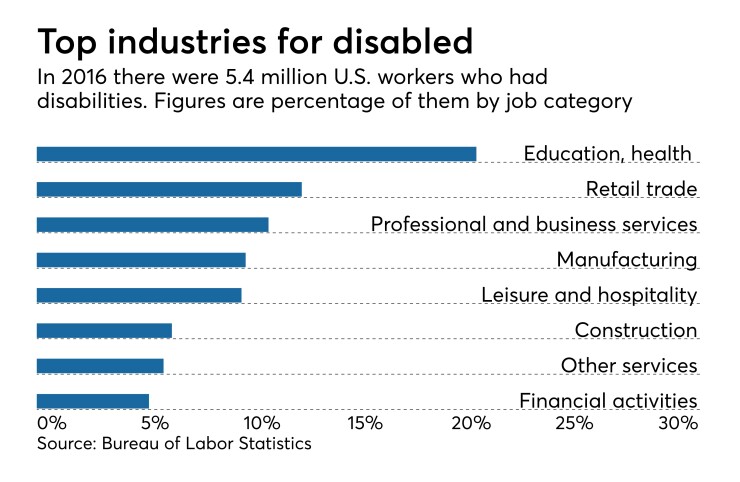If there’s one thing Fifth Third Bancorp’s Mitch Morgan wants people to know about Project SEARCH, it’s that this isn’t a charity case.
Project SEARCH is a high school transitional program aimed at preparing young adults with intellectual and cognitive disabilities for the workforce. How could it not tick a lot of boxes where diversity and inclusion are concerned?
But first and foremost, the $142 billion-asset Fifth Third joined the program because it was facing a shortage of talent, said Morgan, who is the bank’s manager for diversity and inclusion. Simply put, the bank had jobs it desperately needed to fill, and this was one way to do that.
“You can’t go into this thinking that you’re saving anyone. This is not a savior program,” Morgan said. “This is a program that allows individuals who just happen to have a disability the opportunity to gain skills so they can go out and be active members of society.”

There is an increased awareness that financial institutions can do more to make financial services accessible to people with disabilities. Besides the legal and altruistic reasons, about one in every five Americans has a disability, and it simply makes good business sense to meet their needs.
Project SEARCH was originally developed at Cincinnati Children’s Hospital Medical Center in 1996. Today, the nonprofit has more than 500 program sites worldwide, with most them in the health care industry. Fifth Third was the first bank to launch Project SEARCH, 13 years ago, and last year TD Bank became the second.
TD Bank learned of the program through its partnership with the Arc of Camden, a community organization in Camden County, N.J., for people with intellectual disabilities, said Jocelyn Weyrauch, diversity vendor manager at TD Bank. The Arc and Camden County Educational Services Commission wanted to bring Project SEARCH to the Philadelphia suburb, and they needed a host employer to make it work.
The program runs from September through June, Monday through Friday, for about the length of a typical school day. Interns kick off their day with an hour in the classroom, working on skills like resume writing, interviewing for jobs and money management. They spend the majority of their days working alongside employees, with and without disabilities, in a department where they have been assigned a 10-week rotation.
Project SEARCH interns each go through three rotations in different departments at the host employer. That might mean working in the loan processing department, in lockbox, or even in information technology. When TD Bank began its pilot, the company looked for functions that involved repetitive tasks that could help participants build skills, Weyrauch said. Interns are also matched up with departments depending on their particular capabilities and interests.
“For most people on the [autism] spectrum, that is their comfort zone,” she said. “They like repetition, they like patterns, they like to know what to expect.”
Both Fifth Third and TD Bank said the program has been well-received among other employees. For some, this might be their first exposure to a person with a disability that is not physically apparent, and the program seems to lift morale, Morgan said. He even cited one Fifth Third department that found a 30% improvement in attendance after hosting a 10-week rotation.
Fifth Third has 31 employees on staff whom it hired because of Project SEARCH, and Morgan said the bank has hired at least one graduate from the program every year. Fifth Third now hosts three Project SEARCH groups each year, two in its headquarters city of Cincinnati and one in Grand Rapids, Mich.
Fifth Third’s program has graduated 298 students since its inception and 74% have gone on to hold jobs working at least 20 hours a week for a prevailing wage and benefits, he said. By comparison, the national employment rate for people with disabilities was a shade under 18% in 2016, according to the Bureau of Labor Statistics.
TD Bank currently has three Project SEARCH interns — this is its pilot year — and during its next rotation in the fall, it will accept nine students.
Employers can do a better job of hiring more people with disabilities by making what are often very simple accommodations during the hiring and interviewing process, said Simon Dermer, a co-founder of the assistive tech vendor eSSENTIAL Accessibility.
“They may already be interviewing people with disabilities, but they don’t know it because the candidates don’t disclose it,” he said.
Yet inviting voluntary disclosure can be challenging.
“Prospective employees often have good reason to worry that disclosing a disability will hurt them in the application process, but autistic job seekers often do need accommodations in the interview process,” said Samantha Crane, director of public policy for the Autistic Self Advocacy Network.
Likewise, no company wants to wade into the legal quagmire of asking illegal questions during a job interview.
Outside a specific hiring program for a targeted disability, employers can make it clear they are willing to provide reasonable accommodations during the interview process if candidates ask for them, Crane said.
Weyrauch said that TD Bank has a centralized accommodations function that focuses specifically on workplace accommodations.
“Recruiters all have good intentions, but they need help sometimes,” she said. “[People with disabilities] can still do the job — they may do it differently, but they need the opportunity to prove they can.”





